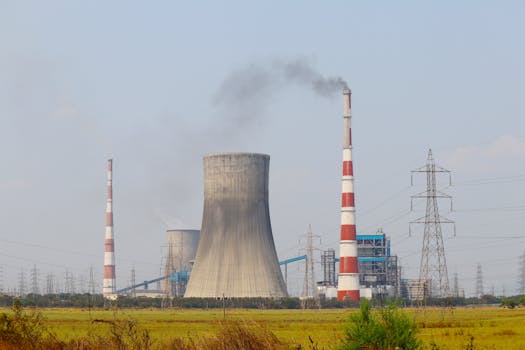Impact of New Regulations on the Energy Industry
The energy industry is undergoing a significant transformation due to new regulations aimed at reducing carbon emissions and promoting renewable energy sources. This article explores the impact of these regulations on the energy industry and the opportunities and challenges that arise from them.

Impact of New Regulations on the Energy Industry
The Impact of New Regulations on the Energy Industry is a significant topic of discussion in recent years. The energy industry is undergoing a significant transformation due to new regulations aimed at reducing carbon emissions and promoting renewable energy sources. These regulations are being implemented by governments around the world to combat climate change and ensure a sustainable future for generations to come.
The energy industry is one of the largest contributors to greenhouse gas emissions, and therefore, it is a key sector that needs to be addressed in order to reduce carbon emissions. The new regulations are aimed at reducing the dependence on fossil fuels and promoting the use of renewable energy sources such as solar, wind, and hydroelectric power. This shift towards renewable energy is expected to have a significant impact on the energy industry, and companies are already starting to adapt to the new regulations.
Background of the New Regulations

The new regulations on the energy industry are a result of the growing concern about climate change and the need to reduce carbon emissions. The Paris Agreement, signed in 2015, set a goal to limit global warming to well below 2 degrees Celsius and pursue efforts to limit it to 1.5 degrees Celsius above pre-industrial levels. In order to achieve this goal, countries around the world are implementing policies and regulations to reduce carbon emissions and promote renewable energy.
In the European Union, the Renewable Energy Directive sets a target of at least 32% of the EU’s energy to come from renewable sources by 2030. Similarly, in the United States, the Clean Power Plan aims to reduce carbon emissions from power plants by 32% below 2005 levels by 2030. These regulations are expected to have a significant impact on the energy industry, and companies are already starting to adapt to the new rules.
Impact of the New Regulations on the Energy Industry

The new regulations on the energy industry are expected to have both positive and negative impacts on the sector. On the positive side, the regulations are expected to promote the use of renewable energy sources, reduce carbon emissions, and create new job opportunities in the renewable energy sector. However, the regulations are also expected to increase costs for companies, particularly those that are heavily reliant on fossil fuels.
One of the main challenges facing the energy industry is the need to adapt to the new regulations while still maintaining profitability. Companies will need to invest in new technologies and infrastructure in order to reduce their carbon emissions and comply with the new regulations. This will require significant investment, and companies will need to carefully consider their strategies in order to remain competitive.
Opportunities and Challenges

The new regulations on the energy industry also present opportunities for companies to innovate and develop new technologies. The shift towards renewable energy is expected to create new markets and opportunities for companies that are able to adapt quickly to the changing regulatory landscape. Companies that are able to develop new technologies and business models that are compliant with the new regulations will be well positioned to take advantage of the opportunities that arise from the transition to a low-carbon economy.
However, the transition to a low-carbon economy will also present challenges for companies that are heavily reliant on fossil fuels. These companies will need to adapt quickly to the new regulations and invest in new technologies and infrastructure in order to remain competitive. Companies that are unable to adapt to the new regulations will face significant challenges and may struggle to remain profitable.
Conclusion

In conclusion, the impact of new regulations on the energy industry is a significant topic of discussion in recent years. The regulations are aimed at reducing carbon emissions and promoting renewable energy sources, and are expected to have both positive and negative impacts on the sector. While the regulations present opportunities for companies to innovate and develop new technologies, they also present challenges for companies that are heavily reliant on fossil fuels. As the energy industry continues to evolve and adapt to the new regulations, it is likely that we will see significant changes in the way that energy is produced, consumed, and regulated.




